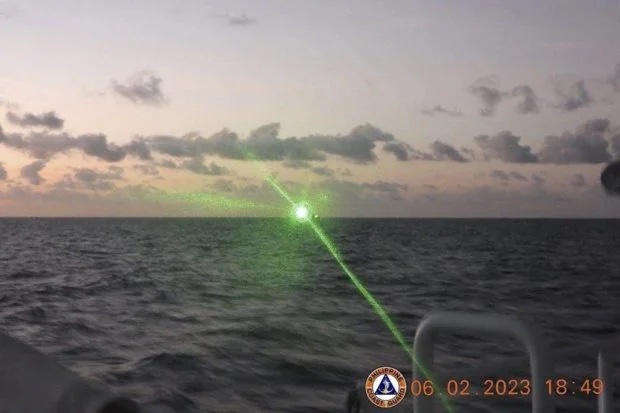
This handout photo taken on February 6, 2023 and released by the Philippine Coast Guard on February 13 shows a Chinese Coast Guard vessel shining a “military grade laser light” at a Philippine Coast Guard boat nearly 20 kilometres (12 miles) from Second Thomas Shoal, in the Spratly Islands in the disputed South China Sea. – The Philippine Coast Guard on February 13 accused a Chinese vessel of shining a “military-grade laser light” at one of its boats in the disputed South China Sea, temporarily blinding members of the crew. (Photo by Handout / Philippine Coast Guard (PCG) / AFP)
MANILA, Philippines — Further escalation in the contested waters of the South China Sea, like an armed attack on the Philippine vessels, would trigger the country’s Mutual Defense Treaty (MDT) with the United States.
The US Defense Department, in a statement, said Defense Secretary Lloyd Austin III made the pronouncement after speaking with Philippine Defense Secretary Carlito Galvez Jr. on Tuesday.
Austin and Galvez conducted the bilateral meeting after the February 6 incident when a Chinese Coast Guard illuminated a green light twice toward the Philippine Coast Guard vessel, which was supporting a rotation and resupply mission of the Philippine Navy in Ayungin Shoal in the West Philippine Sea.
READ: China harasses Philippine Coast Guard vessel with laser
The two Defense chiefs discussed “concerning developments in the South China Sea, including a recent incident in which the People’s Republic of China Coast Guard directed a military-grade laser at the crew of a Philippine Coast Guard vessel lawfully operating around Second Thomas Shoal (Ayungin Shoal).”
“He reiterated that an armed attack on Philippine armed forces, aircraft, and public vessels, including those of its Coast Guard, anywhere in the South China Sea, would invoke U.S. mutual defense commitments under Article IV of the 1951 U.S.-Philippines Mutual Defense Treaty,” the statement further stated.
Signed by two parties on August 30, 1951, the MDT states that both countries would support each other if an external party attacked either the Philippines or the United States.
But for retired Supreme Court Senior Associate Justice Antonio Carpio, China’s laser attack “constitutes an armed attack” which in turn, could already enable the MDT between US and the Philippines.
READ: Carpio: PH can invoke MDT on Chinese laser ‘attack’
Beijing, however, denied Manila’s assertion, saying the allegation “does not reflect the truth.”
China claims almost all of the areas in the South China Sea, including the West Philippine Sea.
But in 2016, the United Nations-backed Permanent Court of Arbitration in The Hague invalidated China’s claim to almost the entire South China Sea.
The tribunal ruled that China’s claim had no basis in international law and that it had violated the Philippines’ sovereign right to fish and explore resources in the West Philippine Sea, the waters within the country’s 370-kilometer exclusive economic zone (EEZ) in the South China Sea.
This after the Philippines, under the administration of the late President Benigno Aquino III in 2013, challenged in the Hague court China’s claim that it owned more than 80 percent of the South China Sea, which included waters in the EEZ of Brunei, Malaysia, the Philippines, and Vietnam.


